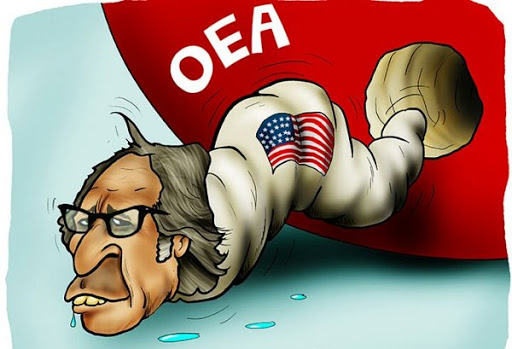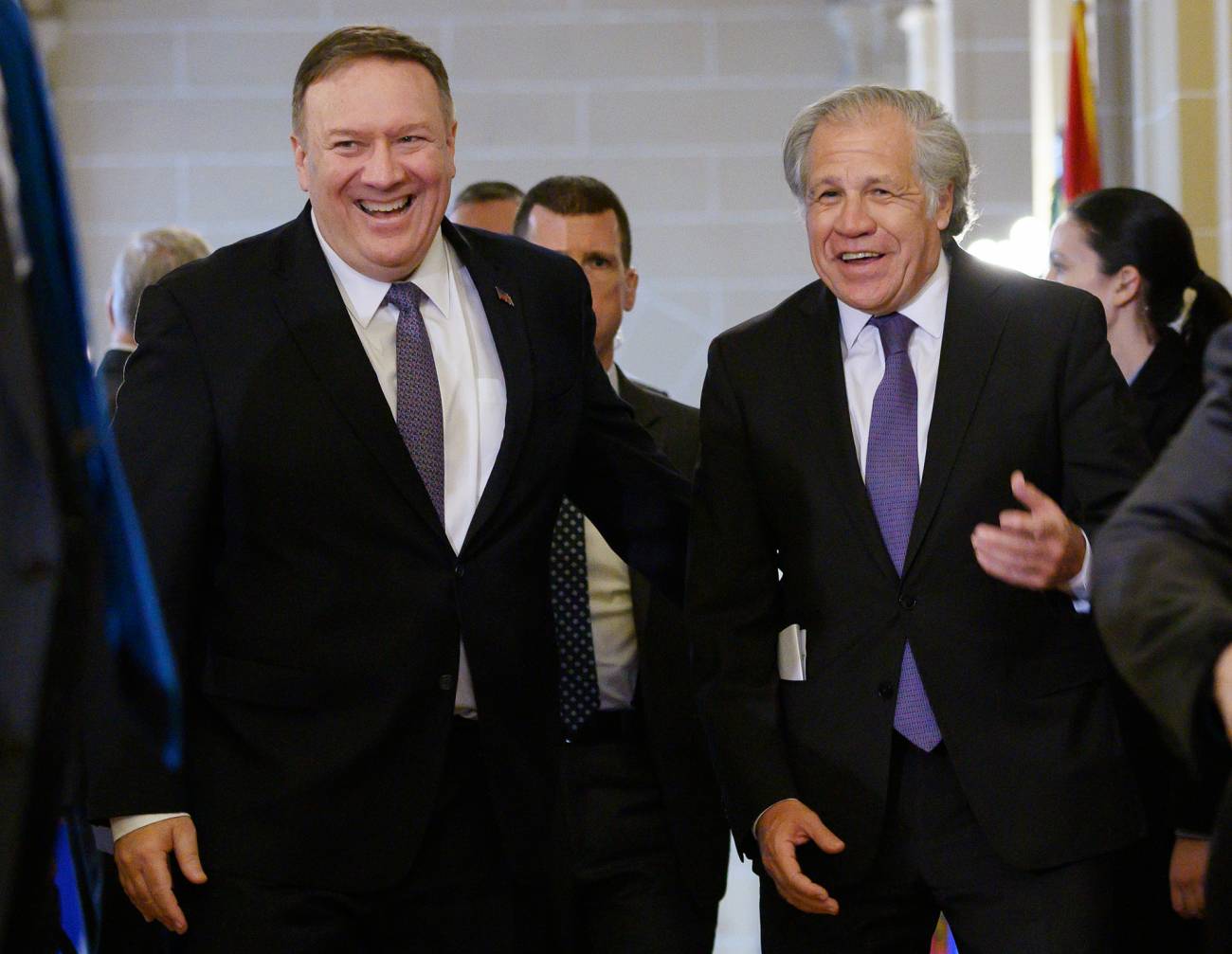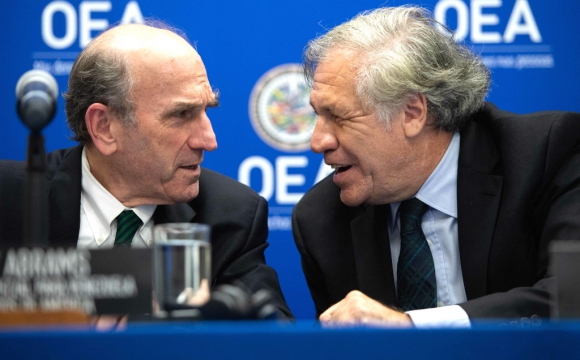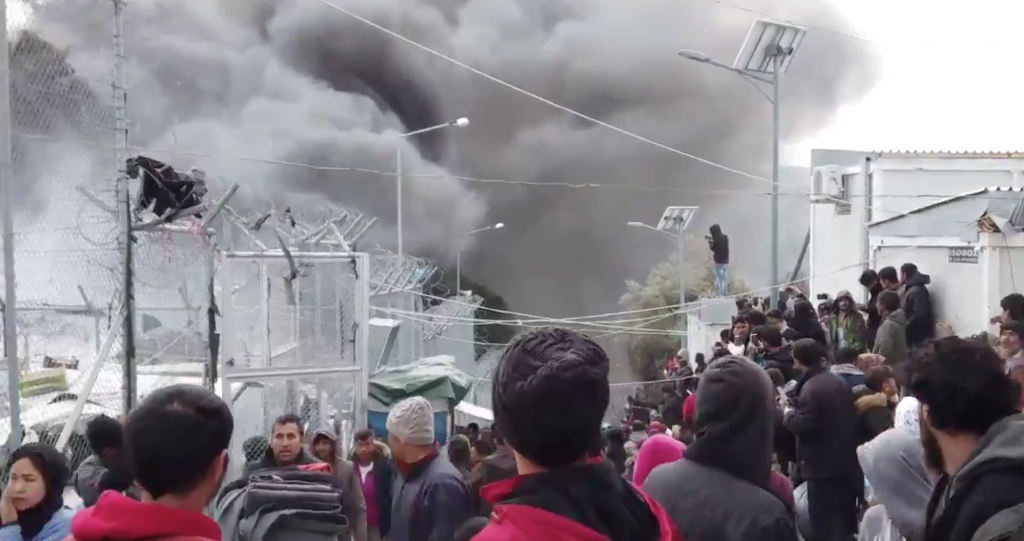Luis Almagro did not need to carry out a coup to be reelected as Secretary General of the Organization of American States (OAS), since the pandemic due to the coronavirus COVID-19 was enough for him to take advantage, without making much noise, to establish himself on the throne of the institution for five more years.
On this topic, the newspaper La Jornada of México published an editorial entitled «Luis Almagro, the other virus» last Sunday -March 22, explaining how the recent election of the Secretary General comes to deepen radicalism in the continent and the divisionism in Latin America and the Caribbean, in order to make this bloc – which increasingly loses its little credibility – an agency that proclaims interventionism as a mechanism of action above democracy, diplomacy, legality and common sense.
«Amid growing concern about the coronavirus, which had led representatives of 17 Latin American and Caribbean countries to request – without success – the postponement of the OAS General Assembly, Uruguayan Luis Almagro was re-elected as Secretary General, office which, against all odds, he has held since 2015, when he replaced the Chilean José Miguel Insulza.
The abundant condemnatory indications received by Almagro’s management (a good number of social organizations expressed, with different variations, that instead of promoting peace, solidarity and the integration of nations, his managment has been one of the greatest factors of instability, division and confrontation on the continent) did not prevent 23 of the 34 member countries of the organization from voting for him to be reelected.
On the other hand, 10 others did so for the former Ecuadorian Foreign Minister María Fernanda Espinosa, a diplomat who in the 2018-2019 period chaired the General Assembly of the United Nations Organization (UN). Those who voted for her (Mexico among them) thought she would be able to iron out the rough edges that Almagro’s often awkward declarations provoked in the OAS. The sum of the votes was 33, because the representative of Dominica was not present.
Near the headquarters of the continental body – which is in Washington – the US president, Donald Trump, surely was satisfied, because the reelected one was, without a doubt, his candidate. Earlier this year, the ineffable Secretary of State, Mike Pompeo, said that the Uruguayan really does capture the values of freedom and democracy.
It is true that the OAS, since its creation in 1948, has always been functional to the interests of successive US presidents, endorsing, from the expulsion of Cuba to the various armed interventions of the United States in the region, passing through the disregard of any government that the White House decides not to recognize as legitimate, whom in his anachronistic speech he calls communists.
However, the wish, until now always frustrated, that the OAS will one day serve what its Founding Charter says it should serve: achieve an order of peace and justice, foster solidarity, strengthen collaboration and defend the sovereignty, integrity and independence of the member countries, has not ceased to exist.
It has been precisely Almagro’s anti-communist rhetoric that has sown the seed of discord in the OAS, saying, for example, that the real coup d’état in Bolivia did not take place with the rise to power of Jeanine Áñez, it was given by Evo Morales when he won the elections; or that the protests in Chile against Sebastián Piñera’s government were the result of harmful foreign influences and not because of popular discontent.
For this reason, the intervention of the ambassador of Mexico in the Permanent Council session highlights the Mexican diplomacy and gives it the brilliance of its best times, saying that with the re-election of Luis Almagro, «the OAS does not celebrate anything (…) except the triumph of bad democratic practices and the confrontation between States».

The USA was impelled to re-elect Almagro
The topic is addressed in an analysis of the Latin American Strategic Center for Geopolitics (Celag), written by Arantxa Tirado, a graduate in Political and Administration Sciences, Ph.D. in International Relations and European Integration from the Autonomous University of Barcelona (UAB) and Ph.D. in Latin American Studies from the National Autonomous University of Mexico (UNAM).
«OAS: reelection in times of coronavirus» is the title of the aforementioned analysis, which details how the US did everything possible to hold a General Assembly while the world applied preventive quarantines against the COVID-19 coronavirus pandemic.
«In an extraordinary General Assembly, held in the midst of the coronavirus pandemic, Luis Almagro has been re-elected as Secretary General of the Organization of American States for the next five years. The exceptional environment, on a global scale, due to the coronavirus crisis has not been an impediment to the holding of this meeting in Washington, a city where the authorities had already taken measures to restrict movements and close some establishments, prior to a confinement that will come sooner or later».
However, the US health authorities authorized the meeting on March 20 and attempts to postpone the vote by 17 states were of little use. The urgency to consolidate a reelection that was taken for granted, and the pressures from the State Department are behind the celebration of an act that, according to the Argentine representative, «is yet to be evaluated if it has been successful in terms of health».
But, in spite of the American pressure so that the Assembly de done quickly and without any major problem, the recent vote demonstrated that the continent is divided, in those who have become accomplices and submissive to the US and those who yearn for other types of international relationships, especially where the sovereignty of countries is respected and the true values of democracy are upheld.
The candidate proposed by Antigua and Barbuda and by Saint Vincent and the Grenadines, María Fernanda Espinosa, obtained 10 votes. What might appear to be a victory with a wide margin of votes is relativized when compared to the voting history of the secretaries general since the 1980s, elected either unanimously or by acclamation. For further contrast, the deputy secretary general, elected after Almagro, Néstor Méndez, was appointed by acclamation.
On this point, Tirado explains that, in fact, the vote for Almagro dramatizes, once again, the existing division in the region between a group of progressive countries or that simply attach themselves to International Law and the defense of multilateral organizations for the resolution of political conflicts, in front of a group of countries whose representatives in the OAS lack democratic legitimacy (case of the representatives of the Bolivian coup plotters and the one sent by Juan Guaidó, who claims to represent Venezuela) or are aligned with the US agenda in the region.
«The forceful intervention of the Mexican ambassador, Luz Elena Baños, after the election of Almagro, had the purpose of highlighting that apparently irreconcilable division. Baños made an allegation of multilateralism, non-interference, legal equality of the States and non-partiality of the General Secretariat. Aspects that, according to the Mexican delegation, Almagro has not respected».

Almagro, at the service of coups
Almagro’s bias during his previous mandate has been explicit. He expressed himself in his activism in favor of the overthrow of the Nicolás Maduro government in Venezuela, which finalized its retirement from the OAS in April 2019.
Almagro, in an unusual exercise, although not surprising, given the origin and nature of the OAS as a lever for US interests, recognized the self-proclaimed «president in charge» of Venezuela, Juan Guaidó, allowing an envoy from that non-existent government to usurp the function of representation of a sovereign State.
Tirado maintains that, in addition to putting all the resources of the General Secretariat at the service of regime change in Venezuela, Almagro also played a leading role in the events that led to the coup against Evo Morales in Bolivia.
In fact, the report of the OAS Electoral Observation Mission (MOE) in the Bolivian elections was used to insinuate the existence of a fraud that led Morales to accept a subsequent audit, the preliminary results of which were used by Almagro to force the fraud thesis and justify the intervention of the Bolivian Armed Forces «requesting the resignation» of the President.
However, as studies by various specialists and organizations have shown, the reports of the MOE had a starting bias that served to establish an erroneous interpretation of the events that ended up justifying a coup against Evo Morales.

Does the existence of the OAS make sense?
Tirado explains in her analysis that the main question that comes up, is not about the process of electing the new secretary general, his previous mandate, or the trajectory of the organization itself, the question is if it makes any sense to maintain a space like the OAS in Latin America and the Caribbean, which managed to put together, despite substantial political differences, its own mechanisms of integration and political coordination outside the US tutelage?
«It is a pertinent question despite the dismantling of the Union of South American Nations (Unasur), perpetrated by the Government of Lenín Moreno together with his allies on the regional right; and even in spite of the de facto ‘immobilisation’ experienced by the Community of Latin American and Caribbean States (CELAC) in recent years», she explains.
The perspectives that are opened are many, in a region that is recovering some States, little by little, for the forces of progressivism (like Argentina) or conquering them for the first time (like Mexico).
For their part, the social struggles of recent months in countries governed by neoliberal forces, such as Ecuador, Chile, Panama, or against the coup in Bolivia, show that the dispute is still open at grassroots levels and that it will ultimately determine the survival of many governments and the ideological sign of governments to come.
«This will have an impact, in turn, on the correlation of forces of multilateral organizations such as the OAS», said Tirado, who maintains that «all of the above allows us to think of a rearticulation of the regional left that would have an impact on the reactivation of the Latin American mechanisms».
Likewise, the situation will be detrimental to the leading role that the OAS claimed in this period of loss of regional consensus, which before Almagro had crystallized in the defense of national sovereignty over ideological divisions.
In this sense, the actions of Mexico in the pro tempore presidency of CELAC will be crucial, comments Tirado, and an example is «what their leadership is doing in its defense of International Law within the framework of the OAS, to build that regional consensus that puts the interests of Latin America and the Caribbean as a unitary actor in the international system, instead of a divided appendix serving the interests of US foreign policy».




